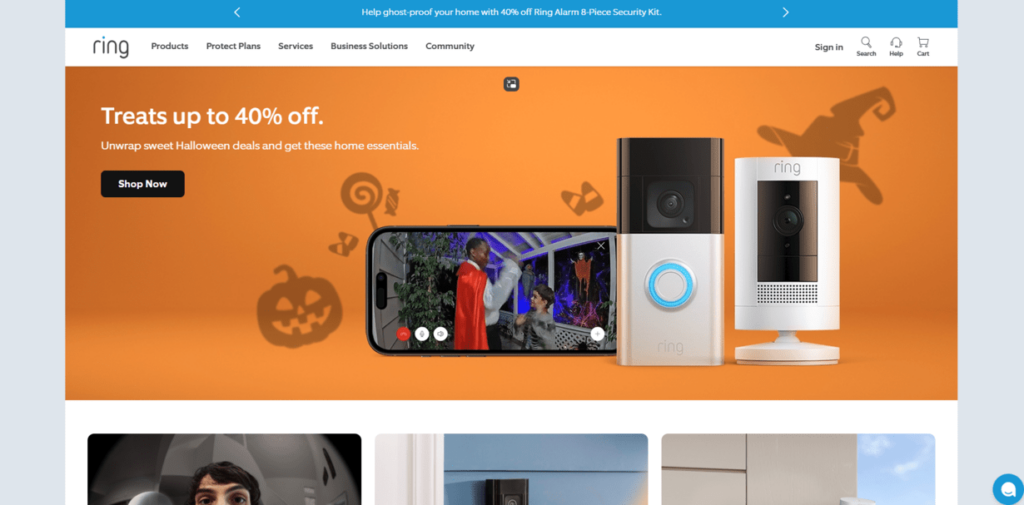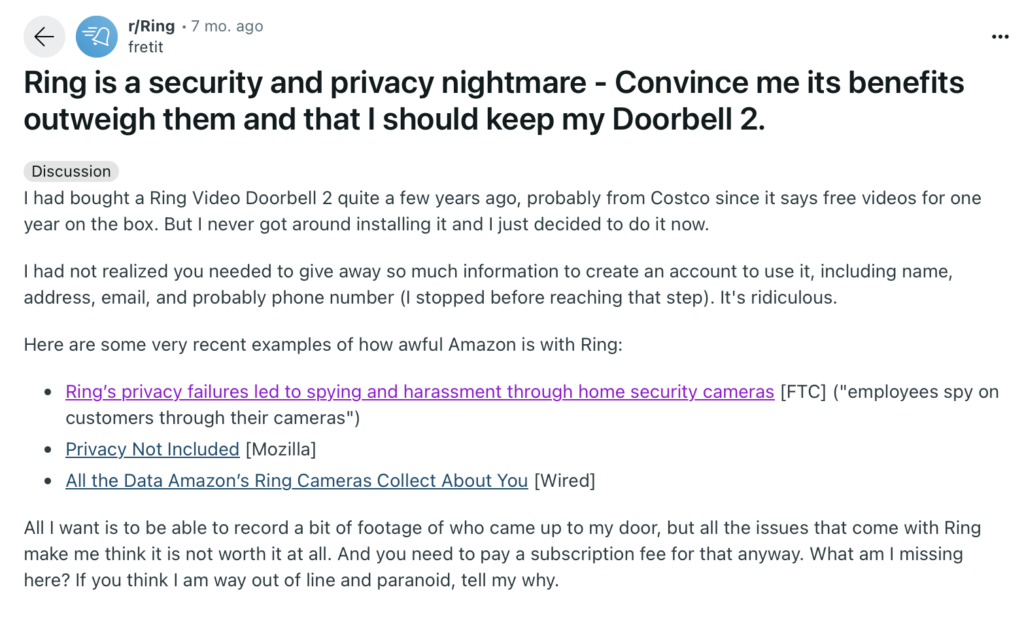Is Ring Safe?
Laura Martisiute
Reading time: 6 minutes

Table of Contents
If you use or plan to use Ring, you need to know: Is Ring safe?
Below, we explain whether Ring is:
- Safe to use.
- Good for privacy.
We also look at some steps you can take to improve both your safety and privacy when using products from this home security company.
What Is Ring?
Ring is a home security company known for its smart devices, particularly video doorbells and security cameras, which allow homeowners to monitor their property remotely.

It was founded in 2013 and acquired by Amazon in 2018.
The company’s video doorbells, which are equipped with cameras, microphones, and speakers, enable users to see, hear, and speak to visitors at their door through a smartphone or computer.
These devices also feature motion detection, sending alerts when someone approaches the door, even if they don’t ring the bell.
In addition to video doorbells, Ring offers a range of indoor and outdoor security cameras designed to provide real-time video monitoring and recording.
These cameras include features like night vision, two-way audio, and motion detection, allowing homeowners to interact with anyone on their property.
Ring’s products can also be integrated with other smart home systems.
Is Ring Safe?
Ring is generally considered safe in terms of the physical security it provides through its devices.
Ring’s video doorbells and security cameras are effective tools for monitoring your home. They provide real-time alerts, high-quality video, and two-way audio, which can deter potential intruders and allow you to interact with visitors even when you’re not home.
There have been reports of unauthorized access to Ring devices due to weak passwords or reused credentials from other breaches.
Additionally, in 2023, an FTC order resulted in $5.8 million in refunds for Ring customers after it was found that Ring employees and contractors were accessing video feeds without authorization.
On its website, Ring says that videos are encrypted by default when in transit (i.e., uploaded to the cloud) and at rest (i.e., stored on Ring’s servers). Users can also turn on optional end-to-end encryption, making it impossible for even employees to intercept and view a feed.
Ring offers two-factor authentication and sends email notifications if a new device logs into your Ring user account. You can also remove shared users at any time.
Is Ring safe, according to Reddit?
Redditors have mixed opinions about Ring.
Some Reddit users say Ring is a privacy nightmare. They say they’re shocked by how much information Ring requires to create an account reference past security and privacy incidents like Ring employees spying on customers.

Others say they’ve been with Ring for years and never had any problems, noting that they’re actually more worried about the data their internet service provider collects about them.

On the privacy subreddit, Redditors say that any home device that has a proprietary app or web service to operate the device remotely is bad for privacy.

Is Ring Private?
No, Ring is not considered private.
Ring collects a significant amount of data from its users, including video footage, audio recordings, and information about device usage. This data is stored in the cloud and can potentially be accessed by Ring or its parent company, Amazon.
This is typical for many smart home devices but might not be suitable for privacy-conscious individuals.
One of the more controversial aspects of Ring’s privacy practices was its partnership with law enforcement. Through the “Neighbors” app, Ring allowed police departments to request video footage from Ring users, often without a warrant. This feature was turned off in January 2024.
According to Ring, they don’t view Ring videos for research and development purposes unless they were made publicly available by customers or individuals who have given Ring explicit permission to use them for this purpose.

In its privacy policy, Ring outlines that it collects personal information (including name, phone number, email, and address), account information, payment information, geolocation, product information, social media information, third-party information, and content captured while its devices are in use (including live video or audio streams, images, and comments).
Ring says it does not sell customer data to third parties.

Terms of Service; Didn’t Read (ToS;DR), a project that rates internet services’ terms of service and privacy policies, has not yet graded Ring. However, ToS;DR notes as a concern that Ring may use tracking pixels, web beacons, browser fingerprinting, and similar technologies to track users.
The Common Sense Privacy Program, which analyzes internet services’ privacy policies, gives Ring a rating of 45% out of 100%. This is a “Warning” rating, meaning that Ring “does not meet our recommendations for privacy and security practices.”
How to Improve Your Safety and Privacy On Ring
Follow the steps below for a more private and secure experience while using Ring products.
- Enable two-factor authentication. Add an extra layer of security by enabling two-factor authentication for your Ring account. This requires you to enter a verification code sent to your phone each time you log in, making it harder for unauthorized users to access your account.
- Use strong, unique passwords. Create a strong, unique password for your Ring account to reduce the risk of breaches. Avoid reusing passwords across multiple sites, and consider using a password manager to generate and store complex passwords.
- Manage video footage and storage. Regularly delete old footage from your Ring account to minimize data stored on Ring’s servers. Turn off video and audio recording when not needed, or set schedules to limit data collection.
- Adjust privacy settings. Limit data sharing by turning off features like “Neighbors” that share your footage with the local community. Control who can access your devices by carefully managing shared users and regularly reviewing access.
- Turn off location tracking. Turn off location services for the Ring app or restrict its access to your location, preventing unnecessary sharing of your location data with Ring.
- Use end-to-end encryption. Enable end-to-end encryption for your video streams if available on your device. This ensures that only you and trusted individuals can view your footage, even when stored on Ring’s servers.
- Regularly update firmware and software. Keep your Ring devices and app updated to the latest versions, ensuring you have the most recent security patches and privacy features.
- Turn off or limit smart integrations. Limit or turn off integrations with other smart home devices or services to prevent unnecessary data sharing. Only connect Ring to services you trust.
- Review the Ring app’s permissions. Check and limit the permissions granted to the Ring app on your device. When not in use, turn off unnecessary permissions, like microphone or camera access.
Our privacy advisors:
- Continuously find and remove your sensitive data online
- Stop companies from selling your data – all year long
- Have removed 35M+ records
of personal data from the web
Save 10% on any individual and
family privacy plan
with code: BLOG10
news?
Don’t have the time?
DeleteMe is our premium privacy service that removes you from more than 750 data brokers like Whitepages, Spokeo, BeenVerified, plus many more.
Save 10% on DeleteMe when you use the code BLOG10.
















